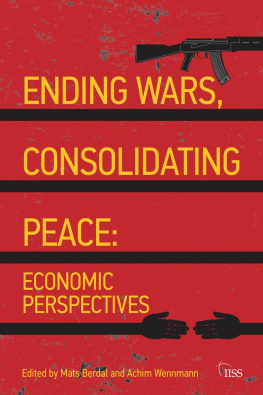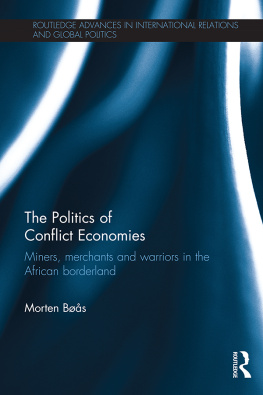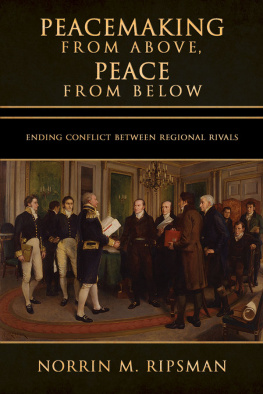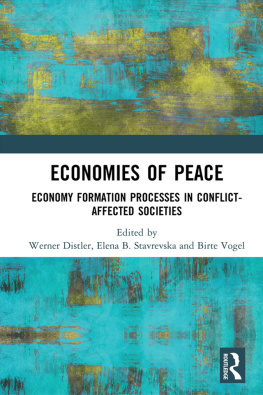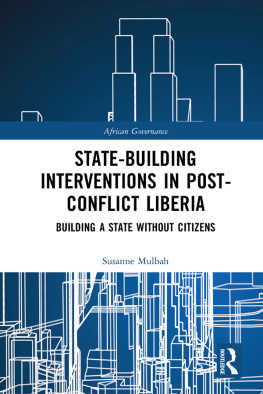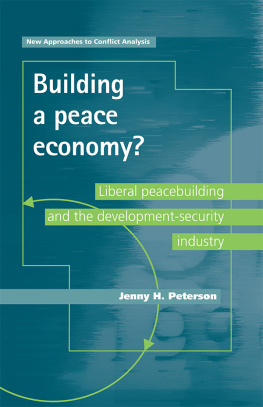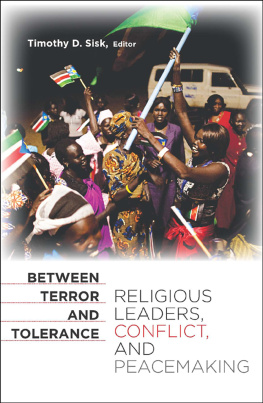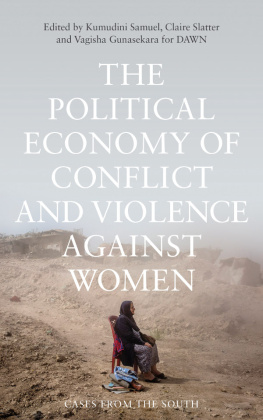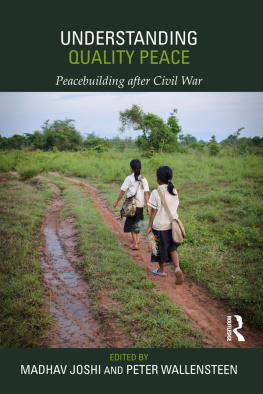The Political Economy of
Peacemaking
This book focuses on the economic dimensions of peace processes and examines the opportunities and constraints for assisting negotiated exits out of conflict.
Various works have addressed the economic characteristics and consequences of armed conflicts over the past two decades, including issues such as blood diamonds, natural resource wars, economically motivated armed violence, self-financing conflict, or the complicity of companies and state elites in conflict economies. However, rather than treating these issues as obstacles to peace, this book explores whether they can be opportunities for peacemaking by adopting a political economy perspective.
The book looks at income sharing from natural resources as an opportunity for forward-looking peacemaking strategies, and the implications of deal-making in situations in which war economies and insecurity provide strongmen with disproportionate political and economic power. The book also highlights that peace processes are not necessarily about the rectification of a conflicts root causes, but rather about what matters most to the main stakeholders at the moment when a peace process starts taking shape. Finally, efforts to establish a lasting peace need to go beyond the traditional set of actors associated with peace processes. The strategic involvement of donor agencies, companies, and diaspora communities can strengthen forward-looking peace processes.
The book will help both student and practitioner audiences to better understand armed conflicts and their belligerents, optimize the planning and management of peace initiatives, and shape expectations in peace agreements. It will be of much interest to students of peacebuilding, armed conflict, Development Studies, International Political Economy, and International Relations in general.
Achim Wennmann is a Researcher at the Centre on Conflict, Development and Peacebuilding (CCDP) of the Graduate Institute of International and Development Studies in Geneva.
Studies in Conflict, Development
and Peacebuilding
Series Editors: Thomas J. Biersteker, Riccardo Bocco
and Keith Krause
Centre on Conflict, Development and Peacebuilding (CCDP)
Graduate Institute of International and Development
Studies, Geneva
This series publishes innovative research into the connections between insecurity and under-development in fragile states, and into situations of violence and insecurity more generally. It adopts a multidisciplinary approach to the study of a variety of issues, including the changing nature of contemporary armed violence (conflict), efforts to foster the conditions that prevent the outbreak or recurrence of such violence (development), and strategies to promote peaceful relations on the communal, societal and international level (peacebuilding).
The Political Economy of Peacemaking
Achim Wennmann
The Political Economy
of Peacemaking
Achim Wennmann
First published 2011
by Routledge
2 Park Square, Milton Park, Abingdon, Oxon OX14 4RN
Simultaneously published in the USA and Canada
by Routledge
270 Madison Avenue, New York, NY 10016
Routledge is an imprint of the Taylor & Francis Group, an informa business
This edition published in the Taylor & Francis e-Library, 2011.
To purchase your own copy of this or any of Taylor & Francis or Routledges collection of thousands of eBooks please go to www.eBookstore.tandf.co.uk.
2011 Achim Wennmann
The right of Achim Wennmann to be identified as author of this work has been asserted by him in accordance with sections 77 and 78 of the Copyright, Designs and Patents Act 1988.
All rights reserved. No part of this book may be reprinted or reproduced or utilised in any form or by any electronic, mechanical, or other means, now known or hereafter invented, including photocopying and recording, or in any information storage or retrieval system, without permission in writing from the publishers.
British Library Cataloguing in Publication Data
A catalogue record for this book is available from the British Library
Library of Congress Cataloging-in-Publication Data
Wennmann, Achim.
The political economy of peacemaking / Achim Wennmann.
p. cm.
1. Peace-building. 2. Peace Political aspects. I. Title.
JZ5538.W467 2010
303.6'6dc22
2010024627
ISBN 0-203-83517-4 Master e-book ISBN
ISBN13: 978-0-415-58626-9 (hbk)
ISBN13: 978-0-203-83517-3 (ebk)
Tables
Preface
Finding a negotiated exit out of armed conflict is like an expedition through a mountain range. At the beginning, the mountaineers know that all previous attempts were aborted at one point, and some may have doubts whether this endeavour is not too risky. To make matters worse,
the mountaineering team is composed of people who have previously been at each others throats, often literally, and who are roped together. They must now overcome their suspicion and fears to accomplish a common task. For many ending the violence is a sufficient objective. If they succeed, a cease-fire may follow. At last travellers are able to peer over the summit but they will not see a tranquil panorama of gentle hills. Instead the view reveals new mountains, some apparently more formidable than the one just climbed. The process, it turns out, requires participants to climb an entire mountain range rather than a single mountain.
(Darby 2001: 4)
This book is about one of the many paths through such a mountain range. It looks at peacemaking from a political economy perspective and elaborates its implications for the engagement, negotiation, and transition phases of peace processes.
The book emphasizes the importance of recognizing the links between the political, security, and economic spheres in the messy and often unjust realities of conflict situations. The book does not suggest that merely getting the economics right will end armed conflicts. Rather, it examines if a better understanding of the economic dimensions of peacemaking offers new opportunities for assisting negotiated conflict endings. The analysis draws on over a decade of scholarly contributions on the political economy of conflict, and distils various research outputs from a multi-year project on economic issues and instruments in peace mediation.
There are three general themes that run through the book. The first is that the economic dimensions of armed conflicts and groups can be opportunities not just obstacles for peacemaking. Issues such as grievances over rapacious natural resource exploitation, the use of economically motivated armed violence, or globalized conflict economies have generally been understood as an integral part of the conflict and, therefore, as a problem for its resolution. This book proposes to reverse this observation and explore how economic issues can be an opportunity for peacemaking and strengthen war-to-peace transitions.
The second theme captures the need to transform peace mediation from a reactive, ad hoc response to security crises or human rights abuses, to a systematic or programmatic approach to assisting transitions out of war and violence. These processes require a constant effort to succeed, and ongoing support mechanisms and capacities. While international attention to mediation support infrastructures is growing, so far the focus rests on ending the violence associated with armed conflicts. While making sure the fighting stops is undoubtedly important, wanting to end a conflict without specifying what next may complicate this very endeavour. For some belligerents, life is better if they continue fighting, or using their guns in criminal violence after a peace agreement. In this context, economic issues and instruments shape visions on what a new future could look like, and strengthen the transitional pacts necessary to achieve it. Such a forward-looking peacemaking strategy applies to both conflict and non-conflict contexts when addressing the challenges related to the youth bulge, urbanization, and criminal violence.


